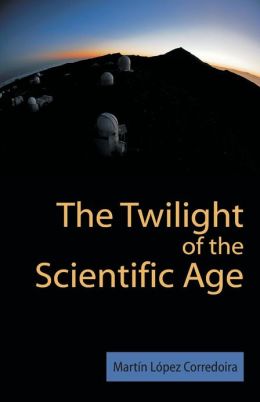Book Review
The Twilight of the Scientific Age
by Martin López Corredoira
The Twilight of the Scientific Age presents an excellent overview of society and its workings, in particular of the corruption that pervades current science. It is a book that deserves to be read and reread.
Martin López Corredoira, its author, is a seasoned astronomer with some 20 years experience doing research in astronomical research centers in Spain and Switzerland, and having published over 50 papers in refereed journals. He provides an insider’s view of what goes on in the business of science and the bottom line is that it is not the idyllic picture that the public is led to believe. Dr. Corredoira leaves no stone unturned and does not spare the rod in his assessment. Everywhere he shines his light we find moral decay, corruption, and big business scientists being more interested in putting money in the pockets of their institutions than in making a dedicated effort to do real science.
This book is dynamite. Corredoira is a whistle blower who is to be congratulated for having the fortitude to break ranks with the old boy’s scientific network and expose what has come to be an unbearable situation, one that ultimately affects every man, woman, and child of our planet. He uncovers the dirt in science and is not afraid to talk about it. While most of the examples Corredoira gives come from his experience in physics and astronomy, what he has to say is relevant for all scientific disciplines.
Dr. Corredoira provides the big picture. He is well read, and shares his knowledge with the reader. He takes us through history from the achievements of ancient philosophers to those of the renaissance and early twentieth century. But as he brings us into the latter part of the twentieth century and into the beginning of the 21st, we see science becoming progressively bureaucratized. Creative ideas that would improve our understanding of science are increasingly suppressed and kept out of journals solely because they challenge the status quo consensus reality that standard science has accumulated and that science power brokers seek to maintain.
Corredoira also touches on the disgusting practice of idea suppression occurring daily on the Cornell internet preprint archive (arxiv.org) where physicists, astronomers, and mathematicians are blacklisted from posting their papers because their work conflicts with the personal viewpoints of a small mafia of Cornell administrators. This practice calls to mind the idea suppression that brilliant minds such as Galileo and Copernicus had to endure under the despotic rule of the Church of the middle ages.
In an earlier posting I had answered someone’s question in regard to why for so many years subquantum kinetics hasn’t entered mainstream science, at least to the extent of being taught in any university science program. If it has had so many predictions that have been verified, why are university scientists not talking about it. Corredoira’s book explains why. The scientific system has become ossified and is unable to function properly to assimilate new and better ideas, particularly those that challenge existing beliefs. In this regard, things have not changed much since the days of Galileo.
On p. 108 of his book he says: “There is an inherent inertia in human brains about accepted world views which take a long time to be changed.” This is essentially the same thesis advanced by Thomas Kuhn in his book The Structure of Scientific Revolutions. Corredoira also states on p. 109 of his book:”…because vested interests gradually vanish with the advance of generations, and it is only after some decades, or perhaps even hundreds of years, that ideas with intrinsic value are distilled and survive to give us their wisdom.”
The result is that society today is saturated with what Corredoira calls “petty science,” a conglomeration of flawed theories and experimental interpretations that have been sanctioned as “truth” by the science power brokers. Gone are the days of original thinking in the science institutions of today. He notes that scientists have today been degraded for the most part into technicians operating expensive machines.
Corredoira views the current status of science as “decadent”, in a state of decline, certainly not the “golden age of science” that many would have us believe. But he offers some ingenious commonsense solutions that would allow us to save science and reverse its current trend. However, he is pessimistic, feeling that this decline will not be averted. He merely alerts us to what he sees is to come. But if even half of the ideas for reform that he presents in his book were adopted, science could be brought out of its current dark age and the resulting advance in innovation could dramatically transform our world for the better. Also the billions now wasted on irrelevant and redundant research could be dramatically cut back with great savings to tax payers.
No brief review of this book can do it justice; so much is packed into this book. Corredoira has given voice to problems in the practice of science that for a long time many of us have felt existed. This book should be of great interest to anyone having an interest in science, especially to those having doubts about the direction that our society is currently headed, and I strongly recommend it as required reading for all who call themselves scientists.
Paul LaViolette, Ph.D.
Further reading:
M. Corredoira “The Twilight of the Scientific Age” Eikasia 2013; https://arxiv.org/abs/1305.4144.

Dear Paul, thanks for your review, I also think Martin Lopez Corredoira’s “Twilight of the Scientific Age” is an important critique, and I have a written a study expanding some of its themes, called “The Death of Science: a companion study to The Twilight of the Scientific Age”, posted on: http://philpapers.org/rec/HOLTDO-13.